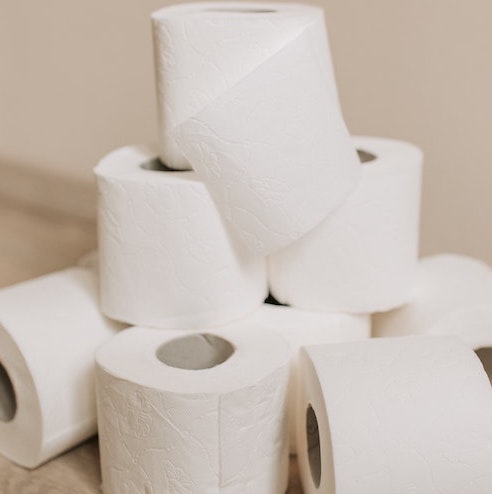Living with a roommate can be an adventure filled with learning experiences and unique challenges. Among these challenges is navigating the everyday habits that each person brings to the shared living space. One such seemingly minor, yet impactful habit is the usage of toilet paper. While it may sound trivial, how we use toilet paper can significantly affect environmental sustainability, household budgets, and even the dynamics of our living arrangements.
This article delves into the curious case of my roommate’s excessive toilet paper usage. We will explore its various aspects, from environmental and economic implications to psychological factors, and discuss practical solutions and communication strategies for addressing this sensitive topic in a shared living environment.

Table of Contents
Understanding the Issue
Living with a roommate brings its own set of challenges and learning experiences. One of the more unique and unexpected situations is a roommate’s excessive use of toilet paper. This issue, while seemingly minor, opens an interesting avenue of observation and understanding about daily habits and their underlying reasons.
Firstly, it’s important to recognize that everyone has their own set of habits and comfort levels, especially when it comes to personal hygiene. The excessive use of toilet paper by my roommate could be rooted in their upbringing, personal hygiene standards, or even a subconscious habit developed over time. It’s a delicate matter, as it revolves around personal habits that are rarely discussed openly.
Observation revealed that the increased usage wasn’t limited to specific times but was consistent. This ruled out the possibility of it being related to a temporary health issue. A pattern of quick depletion of toilet paper rolls became evident, leading to more frequent purchases. It wasn’t just about the quantity, but also the way the toilet paper was used – often in large amounts per visit, suggesting a lack of awareness about the impact of such usage.
The issue extends beyond just an observation. It touches on aspects of sustainability, cost-effectiveness, and shared responsibilities in a household. Excessive use of any household item, especially one as commonly used as toilet paper, has a broader impact. It raises questions about environmental responsibility and the financial implications of over-usage on a shared budget.
In approaching this situation, it’s crucial to balance sensitivity with practicality. Understanding the issue from my roommate’s perspective is as important as making them aware of its broader impacts. It’s about finding a middle ground where personal habits are respected, yet communal responsibilities are upheld.
In the following sections, I’ll explore the environmental and economic implications of this behavior, delve into the psychological aspects behind such habits, and propose practical solutions and communication strategies to address this issue effectively.
Economic Implications
The economic implications of excessive toilet paper usage are more significant than they might appear at first glance. When living with a roommate, managing household expenses is a key part of cohabitation, and seemingly small costs can add up over time. The issue of toilet paper consumption is no exception and warrants a closer look from a budgeting perspective.
To put it into perspective, the average cost of a roll of toilet paper might seem minimal, but when usage is high, the cumulative expense over months becomes noteworthy. In our household, we noticed an increase in the frequency of purchasing toilet paper, which directly impacted our monthly grocery budget. This wasn’t just about the cost of the rolls themselves but also about the incidental expenses associated with more frequent shopping trips – like transportation costs or the temptation to make additional unplanned purchases.

Moreover, there’s an opportunity cost involved. The money spent on excessive toilet paper could be allocated to other household necessities or savings. In shared living situations, it’s important to ensure that expenses are fair and equitable. High consumption by one individual can lead to imbalances in shared expenses, potentially causing friction and discomfort in the living arrangement.
It’s also essential to consider the long-term implications. Over a year, the additional cost might equate to a significant amount that could have been used for joint investments in the household, like better quality furniture, appliances, or even a shared emergency fund.
Addressing this issue requires a tactful approach, especially since it involves financial considerations. Open and honest discussions about budgeting and expense tracking can lead to more mindful consumption habits. It might also be beneficial to explore bulk purchasing options or eco-friendly alternatives that, while initially more expensive, could offer long-term savings.
In the next sections, I will discuss the psychological factors behind such habits and suggest practical, mutually beneficial solutions, including communication strategies and compromises that respect individual needs while managing the economic impact on shared living.
Psychological Aspects
The psychological aspects of my roommate’s excessive toilet paper use are complex and multifaceted. Understanding these can provide insights into their behavior and help in addressing the issue more effectively. Personal habits, especially those related to hygiene, are often deeply ingrained and influenced by a variety of factors.
One potential psychological factor could be a heightened concern for cleanliness. This can stem from personal upbringing or cultural influences where high standards of hygiene are emphasized. In such cases, the use of large amounts of toilet paper might be seen as necessary to meet these standards, regardless of the actual necessity.
Another aspect to consider is the role of habits and routine. People often perform daily tasks, like using toilet paper, on autopilot, without conscious thought about the quantity they’re using. This habitual nature means that they may not be aware of their excessive usage unless it’s pointed out to them.
Anxiety and stress could also play a role. For some, the bathroom can be a place of solace and the act of using toilet paper a subconscious method of exerting control or dealing with anxiety. In times of stress, individuals might unknowingly use more toilet paper than necessary as a form of comfort or routine.
Understanding these psychological underpinnings is crucial in approaching the conversation about reducing toilet paper usage. It’s not just about the act itself, but about understanding and respecting the underlying reasons for this behavior. The goal should be to address the issue in a way that is empathetic and considerate, avoiding making the roommate feel embarrassed or defensive.
In discussions, it’s beneficial to focus on the behavior rather than the individual. Using phrases like “I’ve noticed that we’re using a lot of toilet paper” instead of “You use too much toilet paper” can prevent feelings of accusation and promote a more constructive dialogue.
By delving into these psychological aspects, we can develop a more empathetic understanding of each other’s habits and work towards a solution that respects individual needs while also addressing the practicalities of shared living.
Practical Solutions
Addressing the issue of excessive toilet paper usage requires practical, feasible solutions that balance environmental concerns, economic factors, and personal habits. Here are some strategies we can implement to manage this situation effectively:
- Introducing Eco-Friendly Alternatives: One of the first steps is to consider eco-friendly alternatives to traditional toilet paper. Products like bamboo toilet paper or recycled paper products are sustainable options that can reduce our environmental footprint. Although they might be slightly more expensive, their long-term benefits and lower impact on the environment make them a worthy investment.
- Setting Usage Norms: Establishing a mutual understanding of reasonable toilet paper usage can be helpful. This doesn’t mean policing each other’s habits, but rather setting a general guideline that encourages mindfulness about consumption. For example, we could agree on a certain number of rolls to be used per week and monitor our usage accordingly.
- Bulk Buying: Purchasing toilet paper in bulk can be a cost-effective solution. It reduces the frequency of purchases and often comes with a price advantage. This also allows for better tracking of how much is being used over a set period.
- Educational Approach: Sometimes, simply being aware of the impact of one’s actions can lead to change. Sharing information about the environmental and economic implications of excessive toilet paper use can be an eye-opener. This could be done through a casual conversation or by sharing articles and videos on the subject.
- Implementing Creative Dispensers: Innovations like pre-measured dispensers can subtly control the amount of toilet paper dispensed per use. While this might seem a bit extreme, it can be an effective way to manage usage without direct confrontation.
- Regular Check-ins: Setting regular intervals to discuss household matters, including toilet paper usage, can help keep track of progress and address any ongoing concerns. These check-ins can be a space for open and respectful communication about various household topics, fostering a sense of teamwork and collaboration.
- Encouraging Other Hygienic Practices: Introducing alternatives like bidets or wet wipes (biodegradable options are best) could reduce reliance on toilet paper. While this might require some initial adjustment, it’s a more sustainable and often more hygienic option.
By implementing these practical solutions, we can create a more sustainable, economical, and harmonious living environment. It’s important to approach these solutions with sensitivity and an openness to compromise, ensuring that both roommates feel comfortable and respected in the shared space.
In the upcoming sections, I’ll discuss effective communication strategies to address this issue sensitively and how to create a compromise that works for everyone involved.
Communication Strategies and Creating a Compromise
Effectively addressing the issue of excessive toilet paper usage with a roommate involves not just open communication but also the art of creating a compromise. This combined approach ensures that the conversation is not only productive but also leads to a mutually beneficial resolution. Here’s how to go about it:
- Initiate the Conversation Thoughtfully: Choose a relaxed and private setting to bring up the topic. Begin with understanding and empathy, acknowledging that habits differ and your aim is to find a middle ground.
- Use ‘I’ Statements and Active Listening: Start with ‘I’ statements to express your observations and feelings, like “I’ve noticed we’re using a lot of toilet paper, and I think we could find some ways to manage it better.” Listen actively to your roommate’s perspective to understand their habits and concerns.
- Focus on the Issue, Not the Person: Frame the discussion around the usage of toilet paper and its broader implications, rather than personal habits. This approach keeps the conversation constructive and less accusatory.
- Discuss and Propose Solutions Collaboratively: Present the practical solutions you’ve thought of, and invite your roommate to suggest their ideas. Collaboration is key in finding a compromise that respects both parties’ needs and preferences.
- Develop a Compromise Plan: Aim for a plan that balances both your concerns and your roommate’s habits. This might involve agreeing on a certain usage limit, trying out eco-friendly alternatives, or even splitting costs differently to accommodate usage.
- Establish a Follow-up Mechanism: Agree on a method and time to review the effectiveness of the compromise. This could be a simple check-in after a few weeks to discuss how the new arrangements are working.
- Maintain a Positive and Respectful Tone: Keep the conversation positive and respectful. Emphasize that the objective is to improve your shared living situation and not to blame or change personal habits drastically.
- Be Open to Adjustments: Be prepared to make adjustments to the compromise as needed. Flexibility is important as you both adapt to the new arrangement.
- Respect Their Perspective and Response: Acknowledge and respect your roommate’s response, even if it’s not what you expected. It’s important to maintain a respectful relationship regardless of the outcome of the conversation.
By combining effective communication strategies with the willingness to create a compromise, you can address the issue of excessive toilet paper usage in a way that is considerate, respectful, and effective, leading to a harmonious living arrangement.
In the next sections, I’ll delve into the importance of monitoring progress and adjusting strategies as needed to ensure the long-term success of our agreed-upon solutions.
FAQ
What are some signs that your roommate might be using too much toilet paper?
Frequent replenishment of toilet paper rolls, a noticeable increase in the household’s monthly expenses on toiletries, and visibly excessive use per bathroom visit are common signs.
Is it common for roommates to have differing toilet paper usage?
Yes, it’s common for roommates to have different habits and preferences, including those related to toilet paper usage, due to various factors like upbringing and personal hygiene standards.
See Related Posts

My Roommate Uses a Lot of Toilet Paper

How do I tell my housemate to keep the shared toilet clean?

How to get my roommate to put used toilet paper in the toilet and not in the trash?

My housemate doesn’t flush the toilet each time

What Household Items To Share With Your Roommates

My Roommates Won’t Clean the Bathroom

I Hate My Roommate For No Reason

How do I ask someone to be my roommate?


